Close by the Kokufu bonsai exhibit is the Green Club, home to a massive bonsai vendor area set up to accompany the event. Inside, some spectacular trees are for sale, including the shimpaku below.
What makes for good shimpaku bonsai? In addition to age, character, and beauty – general qualities that apply to all bonsai varieties – I’d say movement. Turning, twisting, even writhing formations of entangled live and dead wood characterize good shimpaku bonsai. Some of the better trees for sale at the Green Club this past winter have awesome movement.

Shimpaku juniper
Some of the trees for sale are quite refined, others are less so. And even though each of the these trees could easily be shown at most of the exhibits I’ve attended, all will benefit from further refinement.
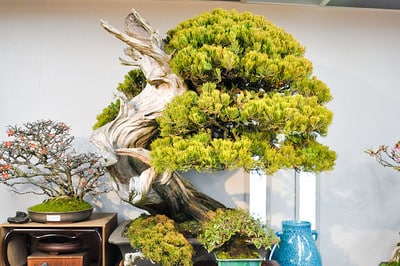
Another awesome shimpaku
No matter how good the wood, bonsai really stand out when the branches exhibit the same age as the trunk. And the better the branch placement, the less likely we are to be distracted by imbalances that can draw our attention away from trees’ best features.
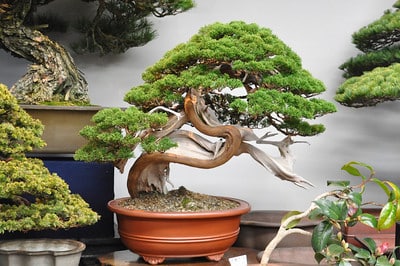
A graceful shimpaku
There’s also some room for fun when styling shimpaku. As the variety that best lends itself to abstract designs, shimpaku make great candidates for creative designs. I’ll admit it – I would not have thought to keep the lowest branch on the tree so far below the rest of the foliage.
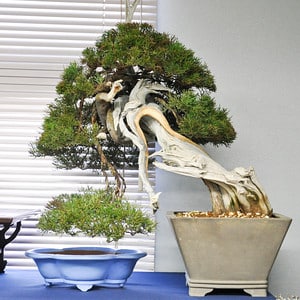
Shimpaku with low branch
And I don’t know that I could have come up with such a well-balanced design for the shimpaku below.
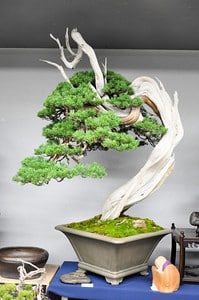
Tall shimpaku bonsai
Of all of the trees pictured here, the following shimpaku reminds me the most of trees I’ve seen in California. Not unlike some California junipers, this tree has one main twist around the trunk and good deadwood.
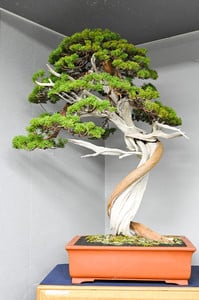
Shimpaku with a twist
Finally, the shaggiest shimpaku of the lot. Less refined trees have been showing up more and more in Japanese exhibits as a trend towards more natural looking trees seems to be gaining traction. I would love the opportunity to decide how much work to do on a tree like this to best show off its unusual trunk.
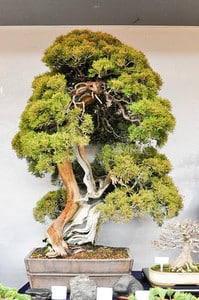
Fun Shimpaku bonsai
Subscribe to Bonsai Tonight
New Posts Delivered Every Tuesday and Friday
Alex V says
It is funny, I looked at each juniper first, then my eyes immediately went to the deciduous and flowering trees in the background. I am beginning to suspect I am biased. I like conifers, but not nearly as much as flowering and deciduous bonsai. Thanks for posting this, we need a sale like the green show here in America.
Alex
Daniel Dolan says
Jonas:
Great images of Shimpaku…..I am always interested to learn about how much could one purchase one of these trees….$1000, $10000, more….were one to actually live in Japan?
Best regards,
D/D
John Kirby says
Jonas, I think I recognize the last tree from a show book. Any ideas?
xwires says
Hi John – I’ll poke around, I don’t know where this tree might turn up off the top of my head.
Daniel – I’ll note some prices in the next post. The prices cover quite a range at Green Club, from starter material to $10,000 – $100,000 specimen.